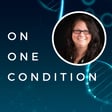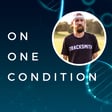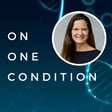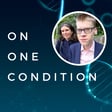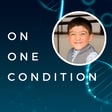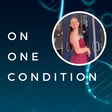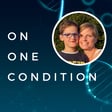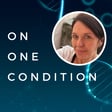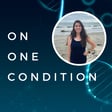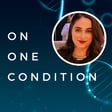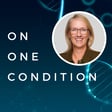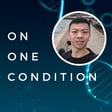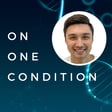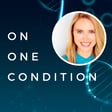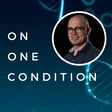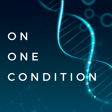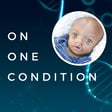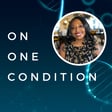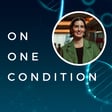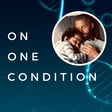Introduction to 'On One Condition' and Nate Milham
00:00:00
Speaker
Hi, I'm Sylvain Bertolo, and you're listening to On One Condition, of podcast to raise awareness about health conditions by listening to people who live them every day. My guest today is Nate Milham, and we're going to talk about HLH.
00:00:16
Speaker
Hi, Nate. Thanks for joining me. How are you? Hello. I'm great. Thank you so much for having me. Well, it's a great pleasure. And I feel bad about this first question because I know it's been a tough one for you.
Confidence and Personal Empowerment through Music
00:00:30
Speaker
What song did you choose and why? The song that i chose is Alien Superstar and by Beyonce. Okay. And why this song particularly?
00:00:44
Speaker
I chose this song because i saw the prompt and it said something that makes you feel good, not something that makes you dance. Beyonce is my favorite artist ever and is someone who can easily make me feel confident and powerful.
00:01:03
Speaker
She's been doing that for as long as I can remember. And when it came to finding my own confidence and building that, she helped me a lot with that. So when this song came out,
00:01:15
Speaker
It particularly struck me because I think it's an anthem for confidence. I kind of find myself sort of resembling an alien sometimes and not, you know, feeling like an alien, feeling like I'm different from the unlike guys sometimes don't always put into all scenarios given the multitude of identities that I carry.
00:01:37
Speaker
So, Alien Superstar really resonates with me, just powerful in being who you are and the beats in that song, energy in that song, the the layers, the levels, the sections, it really just makes me feel powerful. Amazing. Walking by myself or I'm dancing at the bar.
00:01:58
Speaker
It does what it needs to do. Amazing. It's interesting. you i mean, we're not going into the topic at all. and but But I like what you said. the There is ah certain relationship you can have with an artist without knowing them personally. Yeah.
00:02:16
Speaker
Without them knowing you. I get that. Yes. Yeah, she said a lot for me without even knowing. But I survived this long journey. And I thank God that I am existing in the same time that Beyonce is alive and performing.
00:02:30
Speaker
Yeah. Amazing. So let's start with HLH.
Understanding HLH: Nate's Medical Journey
00:02:37
Speaker
I didn't dare trying to explain spell what these these three letters mean, but would you be able to tell us what it means and how it impacts you, please?
00:02:51
Speaker
Yes. So I will first point out that I have no expert. And I will also point out that there is more than one type ah HLH is a type of histiocytosis and i I never want to go into my own story and my own thing without first addressing the family of disorders because are we all in need support and attention but it will help me explain HLH so histiocytosis is a group of rare blood disorders there's at least six and discoveries are still being made so we're not
00:03:32
Speaker
particularly stuck on that number. i'm pretty sure I've said different numbers in different places in this community. But right now we're working with at least six and we're still looking at more. They're a group of rare blood disorders.
00:03:46
Speaker
They resemble immune responses or they can also resemble tumor-like responses. They're impacted different areas of the body, depending on what type you have.
00:03:58
Speaker
The least severe is usually found in skin rashes, and most severe, there's a scale, but you can go all the way up to having CNS implications.
00:04:10
Speaker
And then you have single system disorders, multi-system disorders, and the more severe it is, the more systems are involved. So that's just a general overlook.
00:04:20
Speaker
Now HLH is short for hemophagocytic lymphohistiocytosis is a particular disorder that is more so in my case, immune response.
00:04:34
Speaker
When I was born, I had a genetic mutation called X-linked inhibitor of apoptosis. it It's XIAP for short, and it is essential for immune system regulation.
00:04:49
Speaker
When I was born with this deficiency, it presents in several ways, one of them being IBS and another being HLH. And there's all these other implications as well. But I was misdiagnosed with Crohn's disease when I was seven years old because these symptoms were presenting as IBS.
From Misdiagnosis to Discovery of HLH
00:05:10
Speaker
And i would then continue to be treated for Crohn's disease until I was 19. well. okay well during which time i had more than 16 surgeries and the complete removal of my colon.
00:05:27
Speaker
I was misdiagnosed with Crohn's three different times at three different prominent institutions. And the common thread as to why I was misdiagnosed for so long is because they had never heard of HLH, let alone histiocytosis.
00:05:43
Speaker
So I wound up septic in the hospital when I was 19 after a failed bowel obstruction revision. And this kind of was the point where things came to a head.
00:05:58
Speaker
My organs started failing and some angel in the room who I had not regularly been seeing thought to maybe check for something else.
00:06:11
Speaker
Because my body was in overdrive and k Crohn's was not adding up. So that is the first time they considered genetic testing. And when those results came back, they came back positive for HLH.
00:06:26
Speaker
So they had information for what disease i actually had, and they had an actual path for treatment. At the time i was very, very sick. I was almost dying and there is treatment. There is, there are therapies that exist for patients with history of patients with HLH to treat their condition.
00:06:47
Speaker
But in my case, I was super severe and past the point where I could really consider those therapies. I had a couple quick doses of a couple of medications, one being IVIG and then another being anakinra, which is a chemo drug that helped calm my system down.
00:07:06
Speaker
But ultimately to save my life, I had to have a bone marrow transplant. okay After a few rounds of chemo, I was transplanted in January 2019. That saved my life. And I get to sit here with you today.
Impact of HLH on the Body
00:07:25
Speaker
HLH is just this immune response that essentially triggers your body it shuts it down. So when there is an infection, we call this the trigger.
00:07:36
Speaker
Your body is going to send immune cells to fight that infection. With a patient who has h l h They don't have a function in their body system to turn off the signals that are sending these cells to fight the infection.
00:07:58
Speaker
Once the cells, they kill off the bad infection and they they neutralize the threat, they're still in the body. They're floating around and this is so angry and there's nothing to turn them off. so they start targeting other things that are, you know, otherwise healthy.
00:08:17
Speaker
And so that's when my organs started failing. started, you know, getting really sick. But that's the general idea. Well, the first thing I want to focus on, if you don't mind, is the the misdiagnosis.
00:08:30
Speaker
Now you have the right diagnosis of HLH. Do you know if any of the treatments you received shouldn't have been done? That's a tricky question.
00:08:43
Speaker
And this is going to sound very political, I feel like, or like I'm beating around the bush. i don't know. I can't say for sure because I'm not a medical professional. So I can think that.
00:08:55
Speaker
But what I can say is that genetic testing is possible. It's been around way before I was seven years old. and Newborn screening is something that we're trying to advocate for and to encourage. And for patients with osteocytosis, newborn screening is important because our patients can be screened for these diseases and kids are able to be transplanted earlier. And science does say, have done the research that transplants take to kids fairly well. Yeah.
00:09:32
Speaker
Regardless of if the treatment I had was unnecessary, ah definitely could have been avoided if I was screened earlier and diagnosed correctly sooner.
00:09:44
Speaker
I will say that not every HLH patient has an ostomy bag. Not every HLH patient has had to have their colon removed.
00:09:55
Speaker
The standard care that I was receiving for my quote unquote Crohn's was every time it was seen that I had inflammation my intestines or my blood work counts were high.
00:10:12
Speaker
They would... go in and surgically cut out the portion that was diseased and then stitch me back up. And this was the trend. And in my medical record notes, there was a consistent reading of, quote, Nathaniel Myelam, 12-year-old patient, 13-year-old patient, 15-year-old patient, severe Crohn's disease, refractory to medical treatment.
00:10:35
Speaker
And almost at least 15 documents, you see severe Crohn's refractory to medical treatment. So I will say that at some point someone should have stopped and reassessed the situation because personally, if I'm seeing that someone is consistently over years refractory to the medical treatment that we're giving them, maybe it's the wrong treatment.
00:11:02
Speaker
And I will say that i personally feel that I should not be living with a permanent ostomy bag and I should not have had 16 surgeries. I will say those things are probably really unnecessary. And I do think if I was transplanted earlier, i would have had a very different life, but I'm no doctor, so I can't say for sure, but that's how I feel.
00:11:26
Speaker
Yeah. Yeah. I get that. I get that. So does the bone marrow transplant cure HLH?
The Bone Marrow Transplant Experience
00:11:37
Speaker
I think that is the goal. I know that transplant doesn't always take well to everyone. i know that some transplants fail. I've heard a few success stories of patients who have been transplanted and who are doing much better. so the goal is definitely cure the disease.
00:11:54
Speaker
I unfortunately have also heard just as many stories, if not more, of people who have been transplanted and it wasn't successful or people who are not making it to transplant.
00:12:08
Speaker
which is very unfortunate. But yes, the idea is to cure HLH. Yeah. And newborn screening could help essentially absolutely catch HLH early and get this bone marrow transplant early, which in your situation, i imagine would have been a much nicer childhood.
00:12:32
Speaker
Yeah, especially because... You just know, like, you know that there is that option, that there are families and patients out here who are able to get that done, especially because the three GI doctors from these credible institutions had totally never heard of it.
00:12:53
Speaker
So that's a major problem because HLH didn't just start when I was born. It's been around. And since being in the advocacy space, I have fortunately had the privilege of meeting many history of experts, history of experts who are able to diagnose me from me telling my story in two minutes. I can share my elevator pitch and someone can diagnose me the correct way.
00:13:18
Speaker
And I'm thinking if there is these history experts have been around for so much time, why? Am i being treated in institutions that house history of experts and I'm still being misdiagnosed?
00:13:30
Speaker
Fortunately, one of the places has changed the way that they diagnose Crohn's patients after my case because the symptoms are similar. You know, if you have XIAP and you're presenting with IBS symptoms, there needs to be a step taken to make sure that you don't have a rare disease because the treatment is very different.
00:13:53
Speaker
And I am very grateful that i survived 19 years living my, what I thought was my Crohn's life, but most patients don't don't get that. So I would say that newborn screening is definitely very important. And I'm hoping that we can see a world where patients are really able to take advantage of that and physicians are actually bringing that to the table and introducing that to them.
00:14:20
Speaker
Yeah, yeah, definitely. and And especially if it's difficult to diagnose, then and and and we know that a genetic test is the answer, like it makes perfect sense to include that early on.
00:14:37
Speaker
Going back to how it in impacted you, did your immune system only attack your intestines or did it attack other organs? Yeah. I think generally and the main point of attack was my intestines.
00:14:52
Speaker
I really grew up with GI problems. I had severe stomach pain. I was not able to tell when I had to use a bathroom, how urgently I had to use the bathroom.
00:15:06
Speaker
I grew up in school like wearing pull-ups to school because I could not control my bowels. So I just had this thought that from what I understood about Crohn's,
00:15:18
Speaker
but And my lack of medical knowledge, it made sense to me. I was going to school. I was not able to eat because didn't a big appetite because I was always in pain, a severe stomach pain.
00:15:29
Speaker
The pain was so bad that it made me scared to eat. It made me feel like if I ate anything, then it would just make the pain worse. And oftentimes it did. So I would eat less and then I would lose weight.
00:15:42
Speaker
um And then I still had the trouble going to the bathroom. And so that was kind of like my lifestyle. It wasn't until my episode, I guess you can call it when I'm 19 and I'm septic where I really started experiencing other organ symptoms.
00:16:01
Speaker
and Okay. I had been on TPN for a long time on and off because it's TPN is like it's total parental nutrition. It's a type of nutrition that they provide you in the hospital where it's essentially your electrolytes, basically a a big brown bag.
00:16:20
Speaker
It looks like an IV of the IV fluids. I would say it's like IV fluids times five for people who can't really supply their own nutrition. But basically this is a product that if you're on in front of it for too long, it starts to affect your liver.
00:16:37
Speaker
And so that was something that I had to like watch out for my doctor that to watch out for. yeah And when I was septic, they saw that it was severely impacted. My kidneys were also really impacted.
00:16:49
Speaker
And for a time in the ICU, because I was in there for over a month, I experienced a period of delirium. because of all the crazy going on and all the meds that I was on. And so I was in this state where I wasn't necessarily completely conscious.
00:17:09
Speaker
The sepsis really changed my body composition, I guess. But up until that point, it was mainly the GI, the intestine symptoms.
Growing Up with HLH: Social and Physical Challenges
00:17:21
Speaker
Well, not being able to tell when you need the bathroom as a child, I can imagine that it must be source of massive anxiety.
00:17:35
Speaker
Yeah. Is that how you felt? It is. It is. Especially because... There's layers, you know, it's beyond the health security. It's also, it slips into your social security, not the literal with social security, but when you're in school, when you're surrounded by peers, when you're in elementary school, I was diagnosed with frozen. I was seven. So I spent all my elementary school and middle school years wearing pull-ups to school because I could not tell when I had to go.
00:18:03
Speaker
Yeah, because I had to live through all the experiences. I had experiences where i went to school and things were fine. had experiences where I went to school and things were fine. I would have accidents at school. That's why the pull-ups were there. Because there were periods where I would have accidents.
00:18:17
Speaker
And there were many times where I would have to use the bathroom and go number two, for Respectful Live podcast, to go number two you know at school. And so going to the bathroom definitely became a major source of anxiety.
00:18:31
Speaker
i don't know people... have experienced this, but for me going to school, if you're going to the bathroom for anything other than to pee, it's weird.
00:18:42
Speaker
Apparently people don't poop. I didn't realize that. But so when I was in school, having my condition, I had to use the bathroom. And after a while of being, you know, teased, people looking under of the stalls, people had to know who was in the big stall. And usually it was me.
00:19:03
Speaker
I started carrying all these things with me that probably weren't true, but kids are just kids. So, you know, I smell bad or, you know, I'm weird, you all these things. I ended up having to get a 501 for, forgot what it's called.
00:19:20
Speaker
Some special, those out there would know what talking about. It's a special plan in school that you can kind of create accommodations with the school, with your nurse to help you in your experience.
00:19:32
Speaker
And I ended up getting permission, a special pass to use the nurse's bathroom where it was private because I was getting so much flack for going to the bathroom and with everybody else. Like I just couldn't do it. And I would have to like pick my times. It was to a point where I was trying to duck people and pick times where nobody idea would be in the bathroom. would wait till class is starting. So no one's in the halls.
00:19:55
Speaker
It wasn't sustainable, but that was my experience. It sounds tough. on top of obviously all the medical complications you had to deal with that. That's not, yeah.
00:20:08
Speaker
It's amazing how sometimes kids can be very supportive, but other times they can be horrible. Yeah. I realized, I feel like generally kids are mostly, um don't want to say horrible, but they don't really lead with understanding It's a select few and that's how you kind of find special people. But mostly I think kids are really used to their own lives and their own experiences. And so anything outside of that, that may seem a little unfamiliar. yeah They don't take to it very well.
00:20:42
Speaker
No, no, no, no. I agree. I want to go back to the song you chose. You said that the alien part of Alien Superstar, you can relate to
Identity and Acceptance as a Black Queer Man with HLH
00:20:54
Speaker
Why? Why? am i'm not a white man and I'm not straight. So I think that's why i'm black man and I'm queer.
00:21:08
Speaker
and i had this disease for the longest time that i didn't even know was rare you know but i was misdiagnosed for 12 years so from the time i was small i just saw myself well i didn't know that i was queer all the time i came out my junior year of high school but I definitely feel that through time I've experienced different dynamics based on my identity.
00:21:38
Speaker
When I transferred to the high school i ended up graduating from, I was in my sophomore year of high school. And I moved from a predominantly Black area to a predominantly white area.
00:21:53
Speaker
And it was and major sense of culture shock. I went from seeing many people like me to barely seeing anybody like me. And it was a really hard time for me trying to figure out how to fit in where do I belong here especially because I was new and I have all these conditions everywhere I go i'm bringing my health with me so every new crowd I see I have to figure out how to integrate myself how to like find people who mesh with me and then I also came out so I I relate to the alien part because
00:22:25
Speaker
Also, I'm an Aquarius and I feel like that we lead with uniqueness and authenticity. And I shifted from a place of wanting to or trying to fit in, figuring out how I best could fit.
00:22:42
Speaker
the group that I was in to really leading into the fact that I was different in all cases, just because but ah people don't usually experience the health challenges that I do.
00:22:54
Speaker
And there's 30 million Americans, 300 people worldwide with rare disease, of course, we all have different experiences. But I knew that walking through my life, I wouldn't encounter a lot of people who had experienced what I had. And so I really had to use these experiences to build my confidence because like I said, I, I got my ostomy placed when I was in middle school.
00:23:18
Speaker
So I've had it for over a decade at this point. And i just, I knew that life still had to go on and that one day I couldn't be worried or scared of being myself forever.
00:23:31
Speaker
I think aliens are cool and I'm like, essentially reclaiming my identity. you know I no longer feel like it's something I have to really figure out how I can fit it into spaces, but I let people come to me basically. I accept and acknowledge all the different facets and enjoying them.
00:23:53
Speaker
How my blackness has impacted my healthcare. You know, I've been diagnosed for 12 years, three different times, and history experts have been around. i'm not You know, I can't say anything for sure, but I also know that my pain wasn't always believed.
00:24:09
Speaker
My symptoms had to be proven, and that's not something that everyone experiences. That is something that a lot of Black patients face, is having to prove their symptoms and their pain to their provider, and I definitely experienced that. My mom and I had a time growing up trying to really get our message across.
00:24:32
Speaker
So I just relate to the uniqueness of it. I relate to the fact that when I go a new space, I'm consistently a black gay man who had a bone marrow transplant and who had 16 surgeries and was sick for 12 years and who almost died. And I'm walking around and no one is like looking at me and seeing those things. They're seeing this black man or they're seeing this queer man, but I am this intersectional being You know, and so I do relate to being an alien in that way. And I think it's a powerful thing.
00:25:06
Speaker
Yeah. Yeah. You said something about leaning into being different. Yeah. I it's not directly related to hateel h but I find this really interesting.
00:25:19
Speaker
Yeah. i'd I'd love to hear your experience there.
Authenticity in Social Experiences and Friendships
00:25:22
Speaker
Did your social environment in terms of friendships and so on change as you went into this process of deciding to to be yourself?
00:25:36
Speaker
Yes. It's really crazy looking back now because i didn't come out until junior year of high school when I was in a new school. The system that I was in up until 10th grade, I had never really been around or seen queerness.
00:25:53
Speaker
I had not had any reference for that except for very random rare occasions in school where somebody would be being picked on or being called names because somebody was assuming they were queer or they were queer, you know? So I didn't really have a great association with being queer. And also my family wasn't talking about being queer.
00:26:15
Speaker
i didn't grow up like that. So it wasn't this thought that I had. When I moved to a school where they had implemented a club called the Gay Street Alliance, I knew that at the very least I could be myself here. Yeah.
00:26:32
Speaker
feel comfortable figuring myself out. It was when I i allowed myself to entertain the thoughts that maybe i am gay. And I am grateful that I had the room to do that.
00:26:44
Speaker
Looking back at the other system, I had friends, but I don't know and I don't know the true nature of those friendships because I don't know if I was really me. And I don't know if I was really me until my junior or senior year of high school. And this is where I met two very, very special people to me who are my best friends.
00:27:06
Speaker
And we are still very close today. We actually were able to be roommates at college for a couple of years before I got sick. But I found two special people who saw me beyond...
00:27:19
Speaker
my condition beyond my blackness beyond my queerness and just saw me for my personality. And I think that I tried on different personalities growing up to figure out which one I was, know, when I moved to a new school, I would start going by Nate instead of Nathaniel, which is what I was going by from elementary school because I just wanted to be a new person. I wanted to figure out like who I was.
00:27:45
Speaker
I guess I was, I would consider myself class clown, even though I don't think that's like me naturally. I think am a funny person, but I feel like I was trying to figure out a way to fit in.
00:27:57
Speaker
There's this feeling you have inside. i think when you try that that it, it, you it feels unnatural. i was still feeling like somehow I wasn't really connecting with people, even though I would have conversations people in school, things wouldn't really last or do anything outside of school and so yeah i realized i think the transition from high school to college was the time where i really started leaning into that more i did get sick so there wasn't a lot of time to work on my confidence my personality while sick even though i worked a lot on my voice and my advocacy
00:28:37
Speaker
When I finally was cured from my disease and I went back to school and I graduated with my degree, there is a vibrant queer scene in Washington, D.C.
00:28:51
Speaker
and i live right outside of Washington, D.C. in Maryland. i managed to find some wonderful people queer individuals in Washington, D.C.
00:29:04
Speaker
who I think saw me for me, for the true me. And it wasn't work anymore. Me being myself didn't feel like work.
00:29:15
Speaker
It was an effort I put it in. it wasn't any thought that I had to put into it. And I was making friends and they were appreciating me. So that's when I realized that I was attracting the most when I was being my most authentic self.
00:29:29
Speaker
And when I was trying to fit in internally, i was still feeling like something was wrong. Like something was off. And I say lean into your uniqueness, lean into the difference because It's boring. People out here being the exact same person is boring.
00:29:47
Speaker
i actually am now type person who I only look for who stand out, not with not just with dating, but with but anything, with, you know, partnering, with with forming a team, with advocating and things. like i People stand out to me when they are different, when they bring something unique to the table.
00:30:06
Speaker
And I think those are special people. We don't need lots of people are running around doing the same exact thing all the time being and being the same exact way. So I just think it's special. I think being a unique is special. And everybody probably says that. But there comes a point where...
00:30:21
Speaker
You kind of have to take control of that aspect of your life, because if not, then inevitably you'll start falling into this pattern and you may be living this unhappy, unauthentic life yeah and stuck in it.
00:30:39
Speaker
And so that's just a really, really scary thought. And i really encourage people to just lean into being different, the right people. will find you when you're yeah authentic self.
00:30:51
Speaker
Yep. i mean, you've, you've only said very interesting things that i are worth everyone hearing, but, but this one is, I think is the top one so far.
00:31:03
Speaker
I really hope people, you know, people sing on that because yeah think there's a lot of us out here who are trying to find our place in the world and trust me, I still am, but One thing I know wherever I go is that at the very least I can say I'm confident in who I am and I'm not changing.
00:31:21
Speaker
And that at least gives me a bit of power. Yeah. Yeah. So I will take us on a slightly different topic, which is your degree.
Career Shift to Health Services Management
00:31:35
Speaker
Yes. Can you tell us what you're, what you've done and why you've chosen that degree? Yes. So my degree is in health services management.
00:31:47
Speaker
It actually took a journey getting there and I'll get there quickly. But I didn't go to school initially wanting thinking about a health services management degree. I went to school wanting to be a nurse.
00:32:00
Speaker
So when I was going through all of my health journey, My nurses were the number one people in these facilities that stood out to me. I fortunately had many, many, many wonderful nurses who literally deserve like ah TV show or something. Like they were so cool. I love them so much.
00:32:24
Speaker
And then, you know, of course you have some nurses who aren't that great, but My nurses growing up inspired me to want to give back in some way. I was like how can i make someone feel the way that my nurses make me feel?
00:32:39
Speaker
Protected, um taken care of, secure. i felt more comfortable with my nurses than I felt with my doctors. And it got to a point where sometimes they would be at odds by the doctors and nurses. And there's this like unspoken power dynamic that happens, even though we're all adult individuals where doctors feel that they are like ordering these nurses around or they're like, you know, dishing out judgment or shame if something isn't getting done. And mom always said something really important.
00:33:12
Speaker
You have to make sure that you use your voice and you speak up you have to give yourself, well, the doctors are here because once they're gone for the day, not thinking about you. They're going home to their family or to yeah their home to the night and they're not there. But overnight it's you and whoever you're with, if you're with anyone and your nurse.
00:33:30
Speaker
And if, you know, you and the nurse have had a long night, I've had a rough night taking care of whatever it is, you know, a leaky bag, whatever it may be. And your doctor comes in the next morning early, turning on your lights and being rude and not introducing themselves. and then they get on the nurse.
00:33:46
Speaker
You know, who am I likely to be trying to defend? and We got to this point where these physicians are coming in and almost attacking my family. So I like, in a very like dramatic way, no, but I wanted to be a nurse because early respected admired my nurses. And so I went to nursing school and this was pre me finding out that I had a rare disease. So I still was under the guise of Crohn's.
00:34:17
Speaker
We're going to fast forward to right around my rare disease episode. Yeah. i that was kind of the the shift for me.
00:34:31
Speaker
I went back to school after i was able to go back and I recovered to nursing school. And I went back and I, i managed to get halfway through. and this was around when COVID was happening and turning apart the world.
00:34:46
Speaker
And i was in clinical, taking care of actual patients, learning and things. And I was just seeing the system that we were working in. I was seeing um the neglects that patients were receiving, especially in a time of major crisis from nurses and other staff alike.
00:35:03
Speaker
And i was also noticing that when I was using this voice that I had, you know, taken a lot of time to craft, it wasn't really getting me anywhere.
00:35:15
Speaker
First of all, was a nursing student. Second of all, I realized after, you know, trying to explain to some people are trying to, you know, get some advice, people were just telling me that it is how it is, that I'm not going to find the wonderful nurses that I had everywhere, you know, that's just not the standard.
00:35:35
Speaker
And my question was why? And I'm like, I feel like people should be talking about this. People should be advocating for less patient neglect. Patients should be treated fairly with care all the time, no matter how many eyes are watching.
00:35:49
Speaker
And so I felt like I i needed to do something more. And I said, I can only raise so much health if I'm working an institution. If I'm a nurse in this hospital,
00:36:01
Speaker
I'm not going to try and be the person that's causing all this noise. You know, I need to be in an environment where I can speak to and impact things on a larger scale.
00:36:12
Speaker
And my what makes me feel good is these things will hopefully trickle down, trickle down to these systems that need the help. So yeah after a minute of being confused and lost and saying, I put in so much time in this degree, my mom put in so much money in this degree that i don't think I want anymore.
00:36:28
Speaker
i eventually, with the help of someone very special, found a major at a school and the major is health service management. Because i I was trying to closely pair patient advocacy with health services management, and figured out a way to do that. And so now this degree encompasses so many things.
00:36:49
Speaker
It's anything that involves a health service. But I have so many skills that I have found when I'm being an advocate. I'm using what I learned in school in so many different ways. I'll be speaking when I talk about clinical trials, when I talk about diversity um and equity in healthcare, when I want to talk about ethics, when I talk about all these different things and, you know, strategic planning and putting on events, creating community collaboration.
00:37:14
Speaker
I feel like it was a perfect degree for a patient advocate or for this lane that I'm trying to walk in. And what gave me that confirmation is when I'm sitting in these conferences with people that I wildly respect, I'm hearing terms and topics that I was learning about in school.
00:37:30
Speaker
So I'm like, this literally ble bled into what I want to do with my career. And I'm very satisfied. um' It was a hard decision. One of the hardest decisions i had to make was my major. But what I've learned is the most difficult decisions in my life have often been best ones.
00:37:47
Speaker
And I am very, very grateful that I was able to get to that point. Yeah. It's very impressive that you've made that that change. like you Thank you. Seriously. And what I find extremely encouraging listening to you is that you made that decision knowing exactly what your goal is.
00:38:09
Speaker
Yeah. And I agree with you that if you want to change the system, first of all, you need to learn about the system. You can't change a system that you don't really understand. And you not only learned about it through your degree, but you've you've lived it. So you're in an extremely good position to explain why you should change the system.
00:38:33
Speaker
Yeah. And I think that I'm not surprised that people listen to you because you must have a lot of very valid arguments. Thank you. Yeah, I have a lot many vastly different experiences that cover so much.
00:38:49
Speaker
But the main goal I've always thought about and pairing my experience with my quote unquote professional expertise or schooling expertise. Like I said, I learned this and I'm still learning being in this space. I did an internship with the EveryLife Foundation for More Diseases and i was already late in turn for one summer and learned all about where is this policy?
00:39:10
Speaker
And that was something that I didn't really learn about much. I didn't really get a good grasp on in school, but it's something I'm very, very interested in. When you're talking about trial, you're talking about the diversity, you're talking about the policy, everything ties in together.
00:39:22
Speaker
And I like to see things, I like see the big picture. So I know how the whole thing works and I can know when I'm working on an individual piece of that picture, i can connect it to or draw from other things that will help me explain better.
00:39:38
Speaker
the goal is because rare disease, the community but before I was diagnosed, it was a mystery to me. But if I'm trying to open it up and I'm trying to teach people and educate physicians and get people on the same level that i am with this knowledge,
00:39:54
Speaker
I have to figure out a way that will help people be interested and relate to it and get that information across easier. And so I feel like if I pair my very real experience with my, you know, not so glamorous time of it growing up and with the actual concrete facts and education that I received, then I hopefully can be the best advocate that I can be. Yeah.
00:40:21
Speaker
Yeah, I'm sure you will. Thanks. Well, I mean, I'm sure we could talk for a lot longer. but Unfortunately, that's all we've got time for today.
00:40:34
Speaker
I have one last question for you. Okay.
Finding Peace and Confidence at the Beach
00:40:38
Speaker
What's your happy place? A place where you feel at peace? My happy place is probably anywhere with my friends, but I will say the beach. I've always loved the beach. I'm not picky about the sand. um That's just my hot take.
00:40:55
Speaker
But yeah I love the beach. I love the ocean. When I was younger, I really enjoyed swimming. And there was a point where my relationship with the beach kind of So it got a little severed because of my bag and my confidence and my parents.
00:41:12
Speaker
And so going to the beach became a fear of being seen at the beach. And I had to work on that as I was working on my confidence. And when I kind of was able to and get that back.
00:41:25
Speaker
it became ah happy place for me again. But it's just somewhere where I can, i can disconnect. And i don't have to think about anything. i really can do that. It's a lot easier to escape when you're really on a place where, you know, there's nothing around, which is you and the beach and your friends.
00:41:43
Speaker
That's my happy place. I also love the beach, so I agree with you. Not that you needed my validation. No, no. That's good to hear. I'm hearing, I'm actually, these days, I'm hearing a lot less people enjoying the beach. I i keep hearing people hating the sand, which is valid.
00:42:02
Speaker
I get it. Well, it's been so nice talking to you. Thank you so much for your time and best of luck with your health services management future. Thank you so much. I'm sure you're going to be very successful.
00:42:18
Speaker
ah appreciate that.

